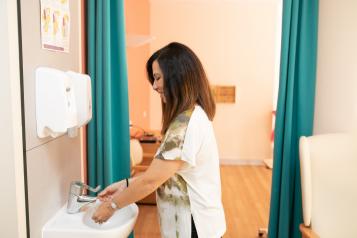Dr David N Jones talks about A&E pressures on BBC Look East

The four-hour A&E waiting time target was brought in 15 years ago and sets out a national standard that at least 95% of patients attending A&E should be admitted, transferred or discharged within four hours.
The NHS is reviewing this measure as well as other national targets in elective care, cancer, and mental health, to reflect the changing environment so that people receive the best possible care.
The NHS Access Standards Review proposal includes:
- The introduction of average waiting time measures. This would mark a move away from maximum waiting times, such as the four-hour A&E target and 18-week target for routine operations.
- New measures to support faster initial assessment and treatment for those with the most urgent needs.
However, when Healthwatch England asked people to give a priority rating of 1-5 for twelve aspects of care in A&E, people said that time spent waiting is less important to them than quick and effective triage, clear communication, access to pain relief, and quality of care.
Dr David N Jones, talked on BBC Look East about the rising pressures and what the public can do to help:
How worried are you about pressures?
The pressures in A&E are a symptom of problems across the health and social care system. It is worrying. I think politicians need to be more honest with the public about what is needed to get the quality of health and social care that we need. I know that the staff in accident and emergency in Kettering and in Northampton have been working really hard to cope with the growing numbers. I was talking today to people and they said they’ve never known the pressures as they are now, so this is really worrying and my heart goes out to people hanging around in corridors for such long times.
Will we have to put more into the system if we expect more from it?
Well, this is a bigger debate then we have time for now, but health costs across the world go up around 5% a year and if you look at America, insurance costs go up anything between seven and 10% a year. We expect our taxes to stay not going up and I think that just isn’t sustainable. If you want health care, we have to find ways to pay for it, but there are things that we can do now which is really important. Some of those you picked up in your earlier piece. If you got life-threatening or serious problems, of course, you have to go to A&E, but your local pharmacy, your GP can help and they are also under pressure but phoning 111 is another option. And the hospital today was saying to me they’re also worried about discouraging people from hospitals and if patients and relatives and friends could help people come out of hospital more quickly, while care is organised, that would really help a lot. Hospitals are dangerous places, we need them when we are ill but we need to get out of them as quickly as we can, and that’s something relatives and friends can help with, but all of this tells us that the health services is facing real pressures and we need an honest debate about how we can solve that.
Do we need a better support system?
I think people who go to A&E with really serious problems get really good care and people talk positively about the support they get. Waiting to get assessed is a real problem. I think we need a conversation in our country about how we support people. You talked about the Corby Urgent Care Center, that is one way of helping but I think a lot of people are going to A&E as a first call if they are worried about something, and really A&E has to be reserved for those serious problems.


